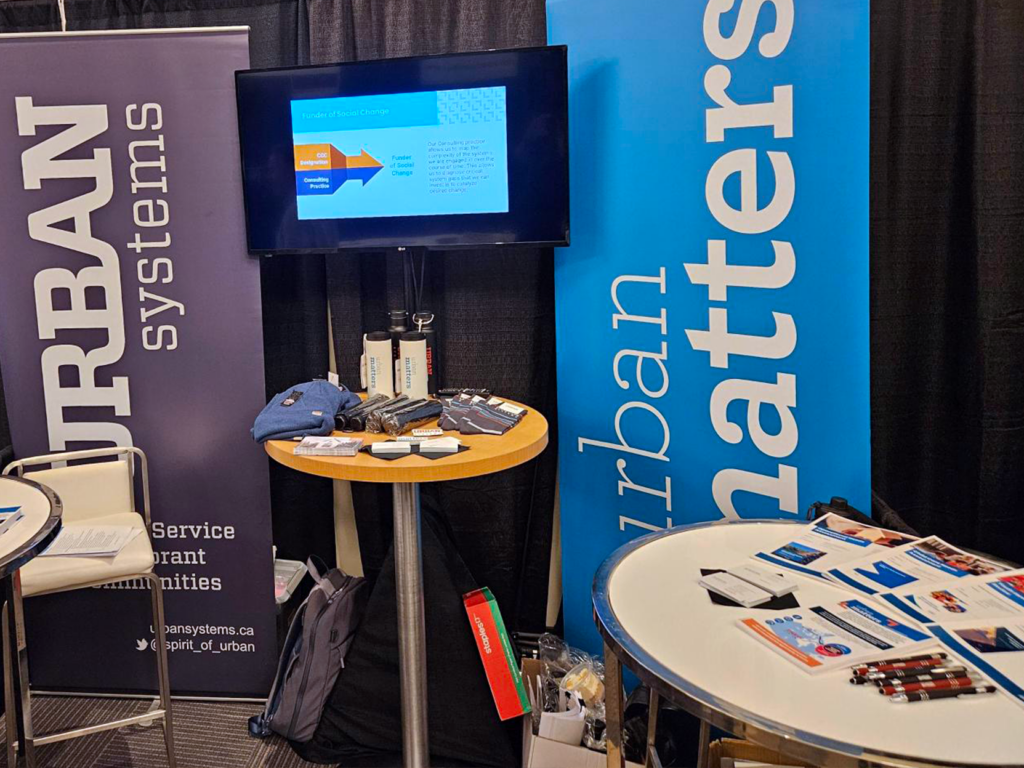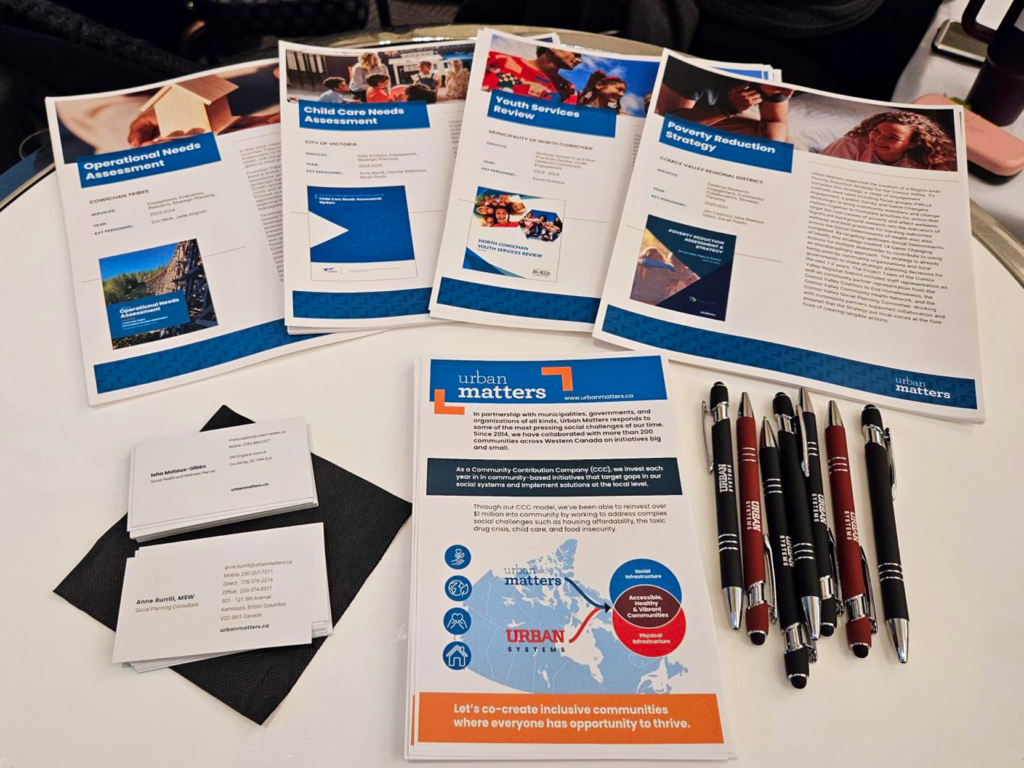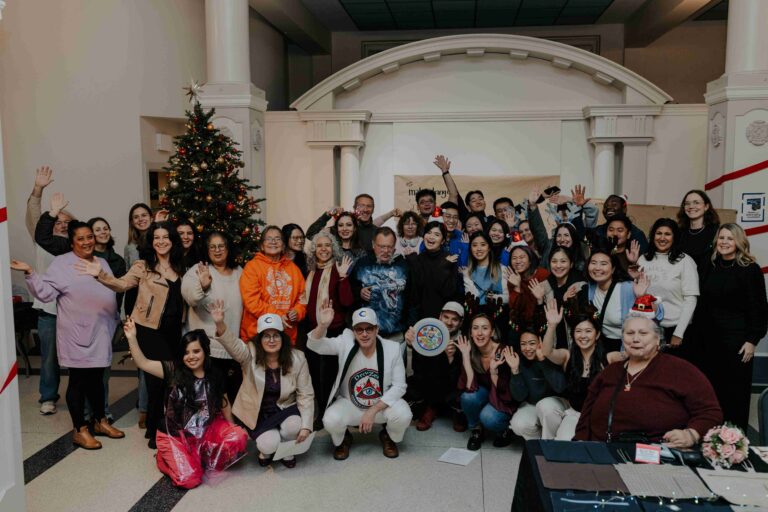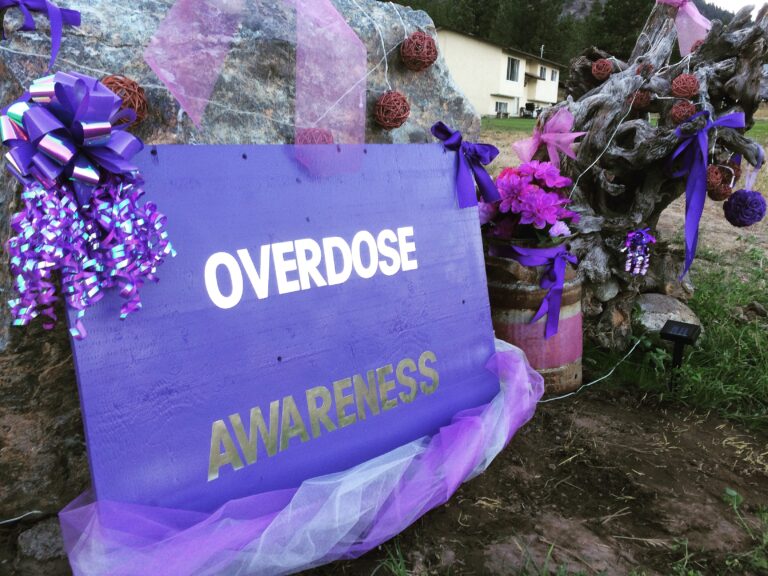
16 June 2025
Listening to Communities: Reflections from the Association of Vancouver Island and Coastal Communities (AVICC) Conference

Cleome Wilkinson, Communications & Engagement Coordinator
Urban Matters recently attended the Association of Vancouver Island and Coastal Communities (AVICC) Conference to connect with elected officials, local government staff, and community leaders. We ran a booth, hosted a workshop on systems change, and had dozens of impactful conversations. While no two were exactly the same, what we heard loud and clear was this: communities are facing complexity, and they’re looking for ways to act. Below, two of our consultants—Anne Burrill and Isha Matous-Gibbs—reflect on what they heard, what inspired them, and how Urban Matters can continue to walk alongside communities through challenge and change.
Q: What were some of the main themes or challenges that came up in your conversations?
Anne: I’d say one big theme was complexity—particularly the complexity of planning in communities.
Isha: Yes, and a sense of “what can we do?” Many people told us the work we’re doing is important and needed, but they weren’t sure where to start in their own communities. There are a lot of moving pieces. Something that stood out was that, you know, elected officials run on a campaign of wanting to make their communities great places. And then I think most of them get into the role and kind of go, holy smokes, there’s a lot going on here. The question is how to translate the complexity into action.
“One big theme was complexity—particularly the complexity of planning in communities.”
Q: Did anything surprise you in those conversations?
Isha: There was one feel good story that came out of a small group conversation at our workshop. They were looking at transportation as a topic, and one of the people in their group was from a very, very small community. This person was talking about purchasing a van that could drive people to and from the city, and the impact that that had made in their community.
And it really helped a person in the group from a bigger community see how small things make a difference, also realize some of the pieces that rural elected officials are dealing with. I think it was an ‘aha’ moment for them in terms of, oh — one small action has these cascading effects.
You often hear about the rural and urban divide in local governments, and I thought it was such a beautiful moment of seeing how rural communities can really teach urban communities —because we often hear about how we translate urban solutions to rural areas. And this was like the other way around, like, here’s this rural area really demonstrating innovation and small change. And flexibility. To just be like OK well, if the problem is no transportation, then we’ll buy a van, right? Sometimes it’s as simple as that.
Anne: Another example was someone in the workshop who was talking about mindset shift and the sort of divisiveness in public opinion. His insight was that he could hopefully help change people’s mindset by having one-on-one conversations with people. I can talk to my neighbor, I can talk to my constituents in a one-on-one environment where I can actually have, you know, a productive conversation about this particular project or proposal or whatever it is and why it’s important to the community, or why it’s important to the people who are going to benefit. And that might be more productive and positive than a large-scale event where there is so much division. It was a one-person-at-a-time approach to shifting public opinion.
Q: Was there anything particularly positive that stuck with you?
Anne: The thing that stood out to me was just the reminder that people are in local government because they’re really passionate about their community. Regardless of any particular agenda, that’s the commonality. Community. They want to see it be a good place to live, and they want to make a difference.
Isha: And, for us —how can we help them understand the problem, see the solution, and provide helpful language to articulate that solution to their constituents. They are dealing with a lot of backlash to their decisions, so being able to showcase success stories in other communities is especially important.
Anne: And the impact on communities and people.
Q: How do you see Urban Matters supporting communities through these challenges?
Isha: I think we can help by breaking big systems into manageable pieces. How can we help with the 15% solutions? It’s really supporting the elected officials themselves to see their role, their power, and their capacity. There is a hunger for solutions, but then: “I don’t know where to start”. So, to me it was really, “How can we can be allies in this work?”
Anne: I completely agree – helping communities figure out the small steps that can lead to change that makes a difference for people in the day to day.
Q: Any last takeaways?
Isha: Just that it was great to be there. I was super appreciative of the chance to have a booth and do a workshop and be part of those conversations. We appreciate being around the movers and shakers in the community, and we look forward to continuing to work on the island and Sunshine Coast and the coastal communities to make a difference. Shoutout to Teresa for an excellently planned and put together event.
Anne: Yes, and just appreciation for the dedication that elected officials have to their communities and the time, care, and contributions that they make. They’re really invested in the well-being of their communities.


Images: Urban Matters tradeshow booth at the AVICC Conference, April 25 2025.
We look forward to continuing these conversations in community. To learn more about this conference, visit their website.




